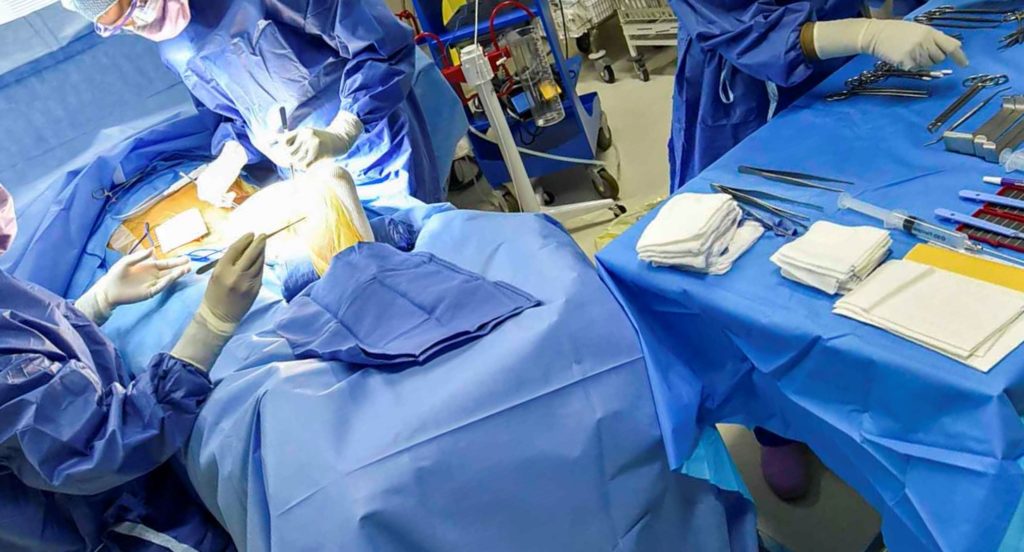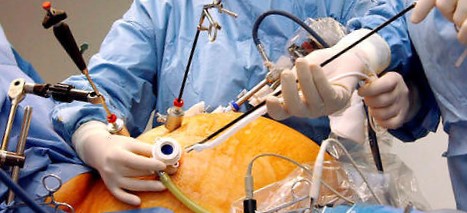Gastric sleeve surgery
Gastric sleeve surgery is a technique that has been performed to offer weight reduction conditions to people with marked obesity or morbid obesity.
The main objective of gastric sleeve surgery is to enable the obese person to lose weight, while at the same time maintaining their health, thus preventing them from gaining weight again in the future.
What is the gastric sleeve?
Gastric sleeve surgery, also known as tubular gastrectomy, is a surgical procedure usually performed laparoscopically, in which the patient receives general anesthesia.
It is a procedure indicated for individuals with a BMI – Body Mass Index between 35 and 40, who have comorbidities, that is, diseases caused by obesity itself, or for people with a BMI over 40, with or without comorbidity.
In gastric sleeve surgery, the stomach is reduced in size, although without losing parts of it. The organ can be 150 to 200 thousand, depending on the patient’s profile, and with a shape similar to a banana.
It is a less radical surgery than other known bariatric procedures, and may offer better results for the patient who needs to lose weight.
What does it consist of gastric sleeve?
In gastric sleeve surgery, the doctor applies a staple in the stomach, making it take the shape of a tube. This gastric tube, which becomes the new stomach, has an average capacity of 150 to 200 thousand, that is, about 10% of the capacity of a normal stomach, which has, on average, 1500 to 2000 capacity.
The reduction in stomach volume makes the patient feel satiated with much less food, leading him to lose weight because it also causes the resection of the gastric fundus, a region that is the main producer of the hormone called ghrelin, one of those responsible for the increase in appetite.
Thus, as the levels of this hormone are greatly reduced after the surgery, the patient is able to lose weight, while also feeling a great reduction in appetite.
Preparation for gastric sleeve
When the doctor determines the type of bariatric surgery for the patient, whether gastric sleeve or any other, with the goal of weight loss, the patient should receive all the information about his preparation for the procedure that he will undergo.
The patient is required to take a series of laboratory tests in the time leading up to the surgery, in addition to receiving specific instructions about eating and drinking, taking certain medications, and possibly also starting a physical activity program. In the case of patients who smoke, the use of cigarettes must be abandoned.
The patient must also be prepared for the recovery period, which can take several weeks.
What happens in Gastric Sleeve Surgery?
Gastric sleeve surgery must be done in an accredited clinic or a hospital, since it is necessary to have all the resources to treat possible complications. Under general anesthesia, the procedure is performed, usually taking a few hours.
Each surgery has its own specificities, depending on the patient’s organic situation and the type of surgery, besides, of course, the practices of the surgeon and the hospital itself.
The bariatrician must decide whether to apply the traditional procedure, with larger incisions, opening the abdomen. This type of surgery is practically outdated, and is mostly performed with the laparoscope, using the imager and enabling small incisions through which the doctor can do the entire procedure.
The laparoscope is a small tubular instrument that has a small camera on one of its ends, which is inserted through a small incision and generates images, through which the doctor can observe what he is doing inside the patient’s body.
The great advantage of laparoscopic surgery is that the patient recovers in less time, and also feels less pain. However, there are cases in which it cannot be used.
In general, gastric sleeve surgery takes a few hours and, after the procedure, the patient is taken to a recovery room, where he or she will be monitored by the medical team for possible complications. Thereafter, it may be necessary to spend 3 to 5 days in the hospital, allowing for a better recovery.
Post-intervention care
After gastric sleeve surgery, the patient can lose between 25 to 40% of their original weight. The values can vary a lot and will depend mainly on the patient himself and on his adherence to the recommended multidisciplinary treatment, with specific diet, physical activities, and control of anxiety and compulsion, among others.
The patient must keep in mind that he/she can put on weight again, since no treatment or surgery for obesity is totally guaranteed.
The treatment can have reversing effects, mainly because it’s a chronic and multifactorial condition. Obesity has causes and behavioral aspects, requiring diet and physical activity, besides its own hormonal, genetic, and psychological conditions.
To avoid getting fat again, the patient needs to be made aware to take advantage of the opportunity, since in some cases they will not be able to undergo the same procedure again.
The decision to undergo a surgical procedure is not so simple, so the patient must talk in detail with his or her surgeon and understand that it is a serious and responsible decision.
Gaining weight again after gastric sleeve surgery can happen, and it can vary in intensity, and this condition must be ruled out with all the determination and persistence of the patient himself.
Alternatives to this treatment
An alternative to the gastric sleeve is the gastric bypass technique , in which the stomach is cut at the top to build a smaller one.
Obesity has many causes, which makes it a difficult disease to treat. Most obese people always try a series of weight loss diets or physical activity programs before considering any other option.
Once they lose weight, the biggest challenge is to maintain the weight. For most obese people, the accordion effect is recurrent, gaining weight and losing weight as the diets that they adopt change.
There are non-surgical alternatives for a person to lose weight, which should also be considered before deciding on bariatric surgery:
Lifestyle intervention
As we said, there are numerous diets for losing weight, but the one that can offer the most results is radical lifestyle intervention. In this case, the patient must make dietary changes and exercise constantly.
With lifestyle intervention, weight loss can be slow and gradual, but it is constant and can guarantee excellent long-term results.
Pharmacotherapy and medication with weight loss
The use of medication is also an effective option, when combined with diet and exercise can be less radical than surgery and show the same or even better results.
What patients can have a gastric sleeve?
The physician is the professional responsible for determining whether gastric sleeve surgery is appropriate for each patient. However, the main reasons for him to reach this conclusion are well determined:
The patient must have a BMI between 35 and 40 for gastric sleeve surgery to be indicated, especially for men, of any age, or for women when they are at age limits, such as under 18 or over 60;
Gastric sleeve surgery can be a patient’s decision, when faced with several options, when the patient does not want to undergo more complex intestinal bypass surgery;
When the patient wants to avoid the risks of ulcers, anemia, or other intestinal complications, generally caused by other types of bariatric surgery;
When the patient cannot undergo a surgery with intestinal bypass, such as in people with previous abdominal radiotherapy, people who have undergone multiple surgeries, who have intestinal adhesions, inflammatory bowel diseases such as retocolitis or Chrohn’s disease.
Advantages and Benefits of Gastric Sleeve
When the patient needs to undergo a surgical procedure to lose weight and the medical choice has fallen on the gastric sleeve surgery, the doctor should clarify about all the positive and negative points about the procedure.
The following are these positive and negative factors about gastric sleeve surgery:
Positive Factors about Gastric Sleeve Surgery
Gastric sleeve surgery, also called vertical gastrectomy, has some positive factors for the patient. It is an ideal type of surgery for patients who may present any risk of complication during surgery.
Unlike gastric banding surgery, for example, the patient does not receive any foreign restrictive devices in his or her body that could cause potential complications.
Gastric sleeve surgery, moreover, causes the patient to lose weight more quickly than they would with other types of surgery, although not as much as with gastric bypass surgery.
Negative Factors about Gastric Sleeve Surgery
The patient must take into account that gastric sleeve surgery, unlike gastric banding, is irreversible. In the procedure, a part of the stomach is completely removed and thus there is no way to undo it.
The stomach is stapled where the cut is made, using a surgical steel staple to hold it closed. The staple is usually well accepted by the body, but can, however, leak, causing other health problems, including infection.
Although it is not a reversible surgery, this does not mean, however, that weight gain after a few years becomes impossible. The stomach is a naturally elastic material and surgery does not change this condition. An improper diet can stretch it again and cause the stomach to increase in size.
Although this bariatric surgery is not reversible, this does not mean that weight gain is impossible. The stomach is naturally elastic and surgery does not change this fact, so improper diets can stretch the stomach again.
How does the Gastric Sleeve surgery work?
How exactly does the gastric sleeve work? First, a surgeon will make a small incision in your abdomen where the sleeve is attached. Next, a small tube that is attached to the band will be inserted into the pouch that is being created and this tube will slowly inflate. This will force the food you are eating out of your stomach and as it leaves, you will feel full and have almost no feeling in your stomach.
As you can imagine, there are many benefits of this operation, including weight loss and feeling full quickly. However, the main thing to remember is that this type of sleeve will only be used in patients with a relatively mild form of obesity and very little severe obesity. If you are severely obese or have some other form of serious medical condition, you should consider other options, such as a tummy tuck.
History and Trend of the Gastric Sleeve
In recent years the Gastric Sleeve or band has been a subject of great interest in the weight loss and nutrition community. There are many who debate the value of this band as an aid to weight loss, even though most agree that it is not a substitute for diet and exercise and should be used only under close medical supervision.
One of the questions that arises is whether or not there is a history and trend of the use of this band in conjunction with other surgical procedures like bariatric surgery or liquid dieting. While it is true that in the past the band was used more as a means of weight loss than anything else, this trend does seem to be changing. While there may not be a great trend of the band being associated with bariatric surgery or liquid dieting, it still seems to be growing in popularity as a means of losing weight.
One of the most common uses of the Gastric Sleeve involves weight loss. For years it was standard practice for those seeking bariatric surgery to wear a band around the mid-section to help with the loss of weight after surgery. The band was most often made of a rubber material, but today this use has gone by the wayside and is no longer used as a means of assisting in weight loss following bariatric surgery. However, many who have lost a lot of weight using the band still use it after recovering from their surgery because they believe that it helps keep them healthy as they embark on a liquid diet.
Today the Gastric Sleeve remains a popular option for weight loss after bariatric surgery in Tijuana. This band is also used to assist those who are suffering from obesity-related conditions like diabetes, high blood pressure, sleep apnea, or heart disease. Those who wear a gastric sleeve do so because of the belief that it allows for easier digestion, as well as increased levels of metabolism and thus helps to burn excess calories when a person is dieting. Even though this is true, no medical or scientific evidence exists to support or oppose the fact that wearing a gastric sleeve does aid in weight loss after surgery.
How much weight will I lose after the Gastric Sleeve?
If you have been suffering from stomach problems for a while and have been wondering how much weight you can expect to lose after the gastric sleeve procedure, then this is your chance to get the answer. Many people are skeptical about gastric bypass surgery, but you should know that this procedure will help you lose as much as seventy percent of your original weight. This is considered to be one of the biggest benefits of this treatment. You will be in a position to enjoy better health without having to put in too much effort.
This surgery will not only help you reduce the amount of food you consume by up to seventy percent, but it will also help you reduce your risk of developing certain health conditions. For instance, most people who undergo this procedure do not develop any of the life-threatening illnesses like diabetes because they have reduced their intake of sweets. You will be able to live a long, happy, healthy life free from diseases that require constant attention. Once you have completed your surgery and lost the weight that you were carrying, you will no longer be required to exercise. You can sit back and relax at home, and the only effort you will have had to make was to follow the instructions given to you by your doctor.
If you are concerned about your current weight, you should now know that it can be easily reduced by up to seventy percent, and there is a very high success rate with this procedure. In most cases, the patient does not need to take any medication to achieve this result. Furthermore, if you plan to lose more weight after the operation, it is advisable to talk to your doctor before starting any diet. He or she will be able to guide you through the weight-loss process, and can help you make healthy food choices for the rest of your life. The gastric sleeve is a great way to reduce your weight and lead a normal life.
Comparison of Gastric Sleeve to other Types of Bariatric Procedures
When compared to the Lap-Band and Gastric Bypass surgeries, a Gastric Bypass surgery has fewer risks. It has been shown that the mortality is very low in patients who have undergone this type of gastric sleeve surgery as opposed to those who have undergone the other types of bariatric procedures. A Gastric Bypass can be used to treat severe cases of obesity or to patients who have undergone an intestinal bypass procedure. Lap-Band surgery is often used for weight loss. A patient on a Gastric Bypass operation needs only two nights in the hospital and has a faster recovery time after the surgery.
Compared to a duodenal switch operation, Gastric Bypass operation involves smaller incisions and faster healing time. A duodenal switch operation requires a larger stomach and it is more invasive than a Gastric Bypass operation. Duodenal switch operation involves feeding the stomach by the small intestine instead of the bypassing the stomach which is more difficult and takes longer time. The duodenal switch surgery also reduces the risks of gallstones and bile ducts.
There are two types of Gastric Bypass, an open approach and a laparoscopic approach. The open approach gastric bypass surgery requires a larger incision and it is invasive than the laparoscopic gastric banding surgery. Both of these bariatric procedures involve a liquid diet to aid in weight loss. The type of fluid diet can vary from person to person depending on their health condition, food preferences and the doctor’s recommendation. The cost of gastric bypass surgery will depend on the medical facilities and the doctor’s recommendations.
What does it consist of?
In gastric sleeve surgery, a surgeon removes part of the stomach and builds a narrow tube or «sleeve» out of the rest. The new banana-shaped stomach is much smaller than the original stomach. After the operation, the person will eat less food, feel full sooner, and be less hungry.
Gastric sleeve surgery is not a type of operation that is limited to fixing the stomach and then forgetting it. To be considered as a candidate for this intervention, a person must commit to changing their exercise and eating habits in the long term. Not all people who would like to have surgery are eligible for this intervention.
Doctors consider many things when deciding whether a weight loss operation is the best option for a teenager. Those things include the following:
- are at least 14 years old, close to that of an adult, and more than 100 pounds (45.4 kg) to lose
- are healthy enough to have this operation
- have medical problems that could improve with significant weight loss, such as sleep apnea, diabetes, or heart problems
- has been shown to be able to eat a healthy diet and exercise regularly
- have family members who will give you emotional and practical support (like taking you to doctor visits or buying healthy food )
Preparing for gastric sleeve surgery
Preparing for this major surgery takes months of work. Patients need to show that they are willing to make big changes in their eating and exercise habits before the operation.
If you are a good candidate for gastric sleeve surgery, the best place you should go is a children’s hospital that has a bariatric surgery program carried out by a team of specialists. Team members will explain what the operation entails, help you prepare for it, and take care of you after the operation. For several months before the operation, you will work with the medical team to develop the skills you need to be successful.
Here are some of the people who are part of the team that helps teens prepare for gastric sleeve surgery:
Doctors and surgeons. Several months before the operation, you will meet with a doctor and a surgeon. They will explain what the operation consists of, examine you, and talk to you about what to expect before and after the operation. They may also tell you about some of the things that could go wrong with the operation (doctors will probably call these «complications»).
Psychologists People experience many emotions before and after the operation. A psychologist can help you understand what you are feeling and help you prepare emotionally for the operation and subsequent changes. For example, when you go out with your friends after the operation, you will not be able to eat as you used to eat.
The psychologist will help you develop coping strategies as you learn to change your relationship with food. He or she will help you with things like worry, stress , or emotional eating . It is always good to take advantage of the experience of a psychologist as you prepare for gastric sleeve surgery.
Dietitians. Since patients often depend on their parents and other family members to prepare or buy food for them, a dietitian will teach you and your family the basics of healthy eating, such as eating nutritious foods, following a schedule of regular meals and take portions of an adequate size .
Gastric sleeve surgery permanently reduces the size of the stomach. You will have to eat less than before. Your dietitian will explain to you what and how much you can eat after the operation, both immediately after and for the rest of your life.
Specialists in physical exercise. These experts help patients to be more active. They will work with you to develop an exercise program that you will enjoy, with regular workouts that you can follow. It will be like you have a personal trainer. Exercising in the months leading up to the operation helps patients to be in better shape for the operation. And this facilitates your recovery.
There’s another reason it’s so good to exercise regularly before surgery: After surgery, it will cost you much less to exercise again if you’ve already made it a habit before. Many patients find that having an exercise routine helps them feel better after the operation, even if they have to proceed slowly. Talk to your doctor and exercise specialist for advice on how to gradually regain your exercise routine.
The operation
Gastric sleeve surgery is a major operation. Doctors will give you anesthesia so that you sleep through the entire operation. When you are completely asleep, the surgeon will remove three-quarters of your stomach, leaving you with a smaller, banana-shaped stomach, which is called a gastric sleeve.
Since it is a major operation, gastric sleeve surgery is associated with some risks, such as the following:
- excessive bleeding
- loss of gastric contents into the belly, from the place where the surgeon cuts the stomach
- poor reaction to anesthesia
- blood clots
- infection
After the operation, you will most likely stay in the hospital for a couple of nights so that the doctors and nurses can monitor your recovery. They will give you medicine for pain and nausea, help you get up and move around the room, and make sure you can drink fluids without vomiting.
Life after gastric sleeve surgery
People usually recover from a gastric sleeve operation within a week. But it will take several weeks for him to eat ordinary foods again. Gastric sleeve surgery reduces the size of your stomach permanently. To get used to having a smaller stomach, you will need to follow a special diet that will start with only fluids. Your dietitian will give you an eating plan that gradually progresses to solid foods; for example:
- During the first 2 to 3 weeks after the operation, you will get your entire diet from high-protein drinks.
- For the next two weeks or so, you will eat foods in the form of puree or porridge.
- Lastly, you’ll switch to bland foods for another couple of weeks before going back to ordinary foods.
How quickly you move from one stage to the next depends on the individual person. Your medical team will advise you based on what is best for you.
If you go too quickly from one phase to the next or eat something your body is not prepared for, or eat too much, you will find yourself very annoying. And it is very possible that you vomit. In the end, you will be able to eat the foods you used to eat. But for the rest of your life, you will always have to eat smaller portions. You will also fill up faster.
Since you won’t be able to eat that much, the foods you choose to eat matter a lot. Your dietitian will help you develop a lifelong healthy diet that includes fruits, vegetables and emphasizes protein. Your dietitian will also recommend vitamin and mineral supplements so that you do not lack essential nutrients.
Your new diet will limit the amount of processed foods and snacks, such as chips and candy. This is because these are foods that have almost no nutritional value (dietitians sometimes call them «empty calories»).
In addition to eating a sensible diet, exercise is an essential part of staying healthy and maintaining weight loss after surgery.
People who follow the recommended diet and exercise program often lose a good amount of weight in the months after gastric sleeve surgery. Afterward, the weight begins to stabilize. Your team of specialists will continue to see you for several months after the operation to monitor your diet and health and to help you follow the treatment well.
What are the drawbacks?
When a person undergoes gastric sleeve surgery, they are making a huge change in the way their body relates to food. It may take a while to get used to your body’s new normal.
Here are some of the problems you may run into in the months following gastric sleeve surgery:
- If you eat too much food or too fast, you may vomit, have diarrhea, or acid reflux.
- Food may move too quickly through your digestive system, causing nausea, cramps, and diarrhea (doctors call this «rapid gastric evacuation syndrome,» «postgastrectomy syndrome,» or «dumping syndrome»).
- If you don’t eat enough nutritious foods or take your vitamin and mineral supplements, you may develop vitamin and mineral deficiencies. This can also happen if your body cannot absorb enough nutrients.
- After losing a lot of weight, you may have loose skin.









